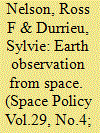|
|
|
Sort Order |
|
|
|
Items / Page
|
|
|
|
|
|
|
| Srl | Item |
| 1 |
ID:
127515


|
|
|
|
|
| Publication |
2013.
|
| Summary/Abstract |
Remote sensing scientists work under assumptions that should not be taken for granted and should, therefore, be challenged. These assumptions include the following:
1. Space, especially Low Earth Orbit (LEO), will always be available to governmental and commercial space entities that launch Earth remote sensing missions.
2. Space launches are benign with respect to environmental impacts.
3. Minimization of Type 1 error, which provides increased confidence in the experimental outcome, is the best way to assess the significance of environmental change.
4. Large-area remote sensing investigations, i.e. national, continental, global studies, are best done from space.
5. National space missions should trump international, cooperative space missions to ensure national control and distribution of the data products.
At best, all of these points are arguable, and in some cases, they're wrong. Development of observational space systems that are compatible with sustainability principles should be a primary concern when Earth remote sensing space systems are envisioned, designed, and launched. The discussion is based on the hypothesis that reducing the environmental impacts of the data acquisition step, which is at the very beginning of the information stream leading to decision and action, will enhance coherence in the information stream and strengthen the capacity of measurement processes to meet their stated functional goal, i.e. sustainable management of Earth resources. We suggest that unconventional points of view should be adopted and when appropriate, remedial measures considered that could help to reduce the environmental footprint of space remote sensing and of Earth observation and monitoring systems in general. This article discusses these five assumptions in the context of sustainable management of Earth's resources. Taking each assumption in turn, we find the following:
(1) Space debris may limit access to Low Earth Orbit over the next decades.
(2) Relatively speaking, given that they're rare event, space launches may be benign, but study is merited on upper stratospheric and exospheric layers given the chemical activity associated with rocket combustion by-products.
(3) Minimization of Type II error should be considered in situations where minimization of Type I error greatly hampers or precludes our ability to correct the environmental condition being studied.
(4) In certain situations, airborne collects may be less expensive and more environmentally benign, and comparative studies should be done to determine which path is wisest.
(5) International cooperation and data sharing will reduce instrument and launch costs and mission redundancy. Given fiscal concerns of most of the major space agencies - e.g. NASA, ESA, CNES - it seems prudent to combine resources.
|
|
|
|
|
|
|
|
|
|
|
|
|
|
|
|
| 2 |
ID:
182556


|
|
|
|
|
| Summary/Abstract |
The use and exploration of outer space is, according to the Outer Space Treaty (OST), to be carried out for the benefit and interest of all parties. Outer space is critically important to the defence and national security interests of many nations, none more so than the United States. Over time, a significant space junk problem has emerged. There is growing recognition of this problem and reason to believe that it will only get worse if current activities continue. Space junk presents a threat to the national security interests and economic interests of spacefaring nations. Various solutions are being proposed and developed. This paper presents an economic perspective and, in a particular, a behavioural economics perspective, on the space junk and national security problem. As various potential technological solutions emerge, we are interested in the obstacles that may stand in the way of an optimal prioritisation of the alternatives.
|
|
|
|
|
|
|
|
|
|
|
|
|
|
|
|
|
|
|
|
|